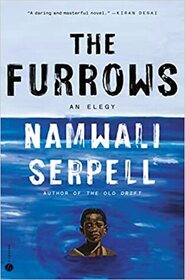Now a Shadow
Twelve year old Cassandra tries in vain to save her seven year old brother Wayne from drowning. She passed out, did not actually see him die, and the body was never recovered. Still-- "I felt him die. He was dead." The irrefutable truth is this young girl's burden to bear alone. Her mother will not admit to his death and starts a foundation to assist finding missing children, at one point traumatizing her daughter with "If he's alive, that means you didn't kill him!" Cassandra's father distantly accepts that their bonds are lost and her grandmother pointedly asks her what she did with that boy.
"I don't want to tell you what happened. I want to tell you how it felt."
What follows are fruitless years of sessions with out-of-touch psychiatrists. There are multiple dreams of her brother dying in different scenarios, each time under Cassandra's watch. Each elation she feels at seeing him is immediately crushed by realizing his death once more. The intense grief is real and halfway through you wonder if this theme can be sustained much longer, where is the resolution?
Suddenly, midway through the book, the narration flips over from Cassandra to a man she is making love to. This man is convinced her brother is still alive and is shadowing him. He takes Wayne's name, investigates the family, meets up with Cassandra, and they quickly fall for each other. If it sounds confusing, it is. We are given bits and pieces of this Wayne's background but things are unclear as to who he really is or represents.
Frankly, Cassandra's voice is sorely missed when the narrators switch. After sharing so much emotional turmoil I mourned the intimacy that had been nurtured. I wanted to hear Cassandra telling me she was on the way to becoming whole again, but of course the gulf that is Wayne's absence can never be filled. We do not lose her, we just see her continue the struggle from a different set of eyes.
In "The Furrows" Namwali Serpell has delivered a touching account of a journey into devastating loss, a journey without a comforting resolution. We are not always told what happened, we bear witness to how it felt.
I received an advance review copy for free, and I am leaving this review voluntarily.
Twelve year old Cassandra tries in vain to save her seven year old brother Wayne from drowning. She passed out, did not actually see him die, and the body was never recovered. Still-- "I felt him die. He was dead." The irrefutable truth is this young girl's burden to bear alone. Her mother will not admit to his death and starts a foundation to assist finding missing children, at one point traumatizing her daughter with "If he's alive, that means you didn't kill him!" Cassandra's father distantly accepts that their bonds are lost and her grandmother pointedly asks her what she did with that boy.
"I don't want to tell you what happened. I want to tell you how it felt."
What follows are fruitless years of sessions with out-of-touch psychiatrists. There are multiple dreams of her brother dying in different scenarios, each time under Cassandra's watch. Each elation she feels at seeing him is immediately crushed by realizing his death once more. The intense grief is real and halfway through you wonder if this theme can be sustained much longer, where is the resolution?
Suddenly, midway through the book, the narration flips over from Cassandra to a man she is making love to. This man is convinced her brother is still alive and is shadowing him. He takes Wayne's name, investigates the family, meets up with Cassandra, and they quickly fall for each other. If it sounds confusing, it is. We are given bits and pieces of this Wayne's background but things are unclear as to who he really is or represents.
Frankly, Cassandra's voice is sorely missed when the narrators switch. After sharing so much emotional turmoil I mourned the intimacy that had been nurtured. I wanted to hear Cassandra telling me she was on the way to becoming whole again, but of course the gulf that is Wayne's absence can never be filled. We do not lose her, we just see her continue the struggle from a different set of eyes.
In "The Furrows" Namwali Serpell has delivered a touching account of a journey into devastating loss, a journey without a comforting resolution. We are not always told what happened, we bear witness to how it felt.
I received an advance review copy for free, and I am leaving this review voluntarily.




